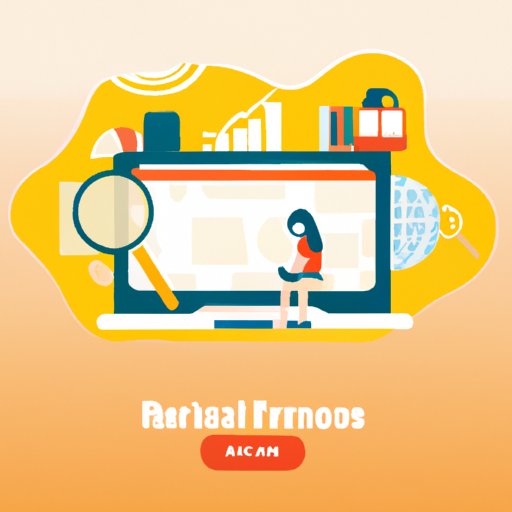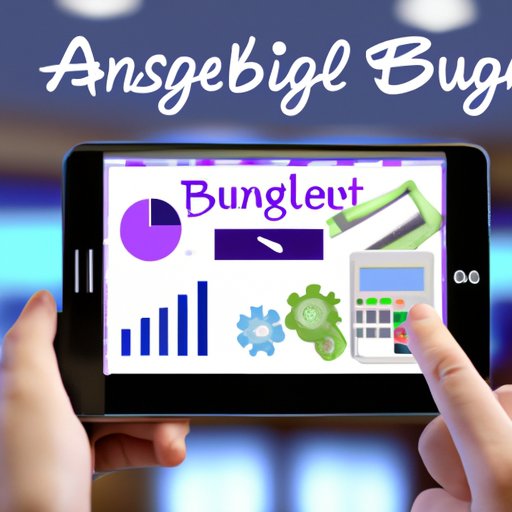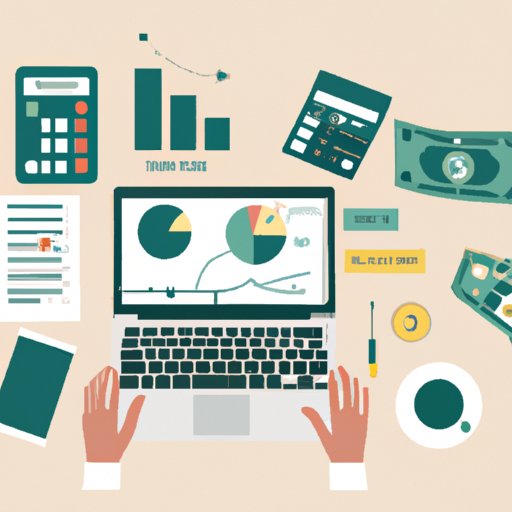Introduction
Financial literacy is an important skill that everyone should have. It involves understanding financial concepts, managing money, and making informed decisions when it comes to spending and saving. Unfortunately, many people lack this knowledge and are unaware of how to become more financially literate.
In this article, we’ll cover how to be more financially literate by discussing topics such as researching financial topics and products online, attending a financial literacy workshop or course, utilizing budgeting apps or software, reading personal finance books, taking advantage of free financial advice from professionals, creating a savings plan, and tracking your spending and expenses.

Research Financial Topics and Products Online
One of the best ways to become more financially literate is to use the internet to research financial topics and products. The internet offers a wealth of information that can help you understand the basics of investing, budgeting, and other financial concepts.
The benefits of researching financial topics and products online include being able to access information quickly and conveniently. You can also find reviews and ratings of different financial products, which can help you make more informed decisions about what to buy.
There are a variety of resources available for researching financial topics and products online. Popular websites like Investopedia and The Balance provide comprehensive guides on various aspects of personal finance. There are also many blogs and forums dedicated to discussing financial topics.
Attend a Financial Literacy Workshop or Course
Another great way to become more financially literate is to attend a financial literacy workshop or course. These courses provide an in-depth look at different aspects of personal finance, including budgeting, investing, and retirement planning. They can help you gain a better understanding of the fundamentals of financial management.
The advantages of attending a course include being able to ask questions and receive direct feedback from experienced professionals. Additionally, you may be able to network with other attendees, which can be beneficial if you’re looking for advice or assistance with financial matters.
You can locate workshops and courses offered in your area by searching online or contacting local organizations. Many universities and colleges offer classes in personal finance, so it may be worth checking with them as well.

Utilize Budgeting Apps or Software
Budgeting apps or software can be a great tool for becoming more financially literate. They allow you to track your spending and income, set up budgets and goals, and generate reports that can help you identify areas where you can save money.
There are a variety of different types of budgeting apps and software available. Some are designed specifically for budgeting, while others offer more comprehensive features such as investment tracking and tax filing. When choosing an app or software, it’s important to consider what features you need and how easy it is to use.
Read Personal Finance Books
Reading personal finance books is another great way to increase your financial literacy. There are many popular books in the genre, covering topics such as budgeting, investing, and debt management. Reading these books can help you gain a better understanding of how to manage your finances and make smarter decisions.
When looking for personal finance books, it’s important to find ones that are relevant to your situation. For example, if you’re looking for advice on investing, then look for books that focus on this topic. Alternatively, if you’re trying to learn how to budget, then look for books that discuss this topic in detail.

Take Advantage of Free Financial Advice from Professionals
If you’re having trouble understanding certain financial topics, then you may want to seek out professional advice. Financial advisors and other experts can provide valuable insights and guidance on how to manage your money more effectively.
There are several sources of free financial advice available. Many banks and credit unions offer free consultations with financial advisors. Additionally, there are a number of online resources that offer advice from professionals. These include websites such as Investopedia and The Balance, as well as social media groups dedicated to discussing financial topics.
Create a Savings Plan and Stick to It
Creating a savings plan is one of the most important steps to becoming more financially literate. A savings plan is a set of goals that you set for yourself in order to save money over a certain period of time. It can include short-term goals such as saving for a vacation or long-term goals such as saving for retirement.
Setting up a savings plan is relatively simple. First, you need to determine how much money you want to save and how frequently you want to make deposits. Then, you need to decide where you want to keep your savings, such as in a savings account or an investment portfolio. Finally, you need to create a budget to ensure that you have enough money to meet your savings goals.
Once you’ve set up your savings plan, it’s important to stick to it. This can be done by setting up automatic deposits into your savings account or by creating reminders for yourself to make deposits. Additionally, you may want to reward yourself for meeting your savings goals, as this can help motivate you to continue saving.
Track Your Spending and Expenses
Tracking your spending and expenses is another key component of becoming more financially literate. By tracking your spending, you can get a better understanding of where your money is going and identify areas where you can cut back.
Tracking your spending and expenses can be done manually or using an app or software. If you choose to do it manually, then it’s important to be consistent and accurate when recording transactions. If you opt to use an app or software, then you should make sure that it offers the features and functions that you need.
The benefits of tracking your spending and expenses include being able to stay on top of your finances and identify areas where you can save money. Additionally, it can help you create a budget and stick to it, which can be invaluable for becoming more financially literate.
Conclusion
Financial literacy is an important skill that everyone should have. In this article, we’ve discussed how to become more financially literate by researching financial topics and products online, attending a financial literacy workshop or course, utilizing budgeting apps or software, reading personal finance books, taking advantage of free financial advice from professionals, creating a savings plan, and tracking your spending and expenses.
By following these tips, you can gain a better understanding of financial concepts and develop the skills necessary to manage your money more effectively. With a little effort and dedication, you can become more financially literate and achieve your financial goals.
(Note: Is this article not meeting your expectations? Do you have knowledge or insights to share? Unlock new opportunities and expand your reach by joining our authors team. Click Registration to join us and share your expertise with our readers.)
